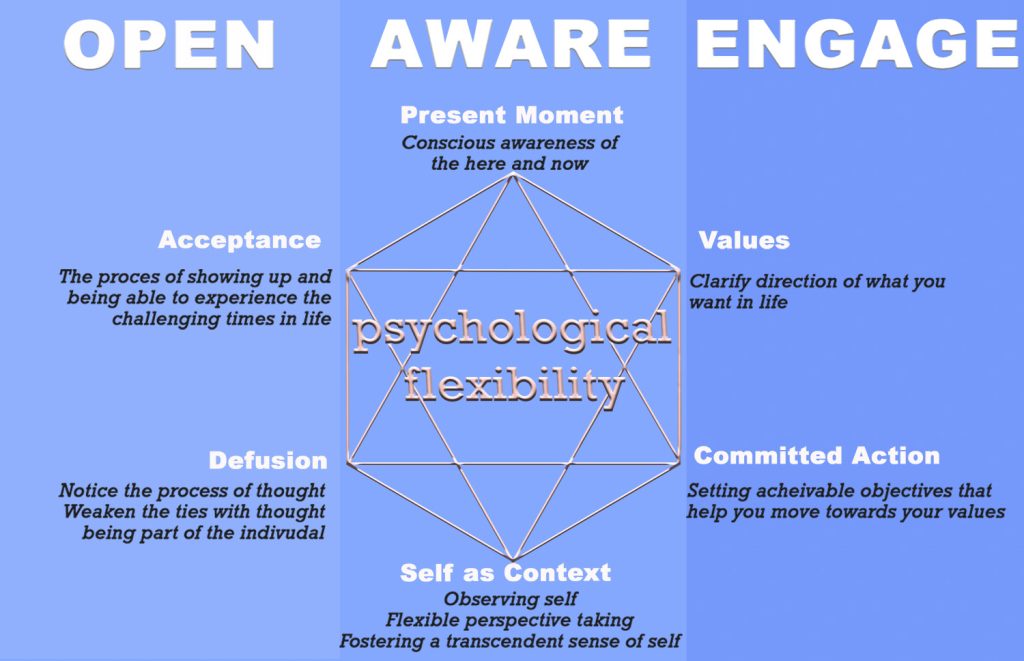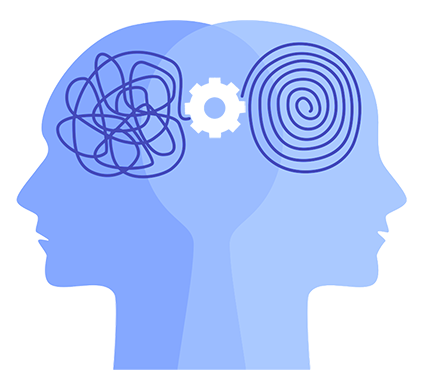The ACT Hexaflex, as created by Stephen C Hayes, is a model that represents the six core processes of ACT
Acceptance Commitment Therapy is a third wave Cognitive Behaviour Therapy that has a solid evidence base over the past 2 decades. The Six Core Processes of the ACT designed to help individuals develop psychological flexibility. This flexibility is crucial for managing various mental health conditions and can be particularly beneficial for neurodivergent individuals. Here’s a summary description of the ACT principles, and how they can help create psychological flexibility. For more information on how they may be suitable for neurodivergent individuals, check out the See more links.

The Six Core Processes of the ACT Hexaflex
Cognitive Defusion
Cognitive defusion involves learning to see thoughts as just thoughts, rather than literal truths or commands that must be obeyed. This process helps individuals detach from unhelpful thoughts and reduces their impact. Neurodivergent people often experience intense and persistent thoughts. Cognitive defusion techniques, such as visualising thoughts as passing clouds or leaves on a stream, can help them gain distance from these thoughts, reducing their power and influence. See more on cognitive defusion here
Acceptance
Acceptance involves embracing thoughts and feelings without trying to change or avoid them. It’s about making room for uncomfortable experiences rather than fighting against them. Neurodivergent individuals may face heightened anxiety, sensory sensitivities, and emotional dysregulation. Acceptance helps them acknowledge these experiences without judgment, reducing the emotional struggle and allowing them to focus on what they can control. See more about Acceptance here
Present Moment Awareness
This process emphasises mindfulness and being fully aware of the here and now. It involves paying attention to the present moment with openness and curiosity. Mindfulness practices can help neurodivergent individuals improve their attention and reduce distractibility. Techniques such as mindful breathing, grounding exercises, or sensory mindfulness can enhance the ability to stay present and focused. See more about Present Moment Awareness here
Self-as-Context
Self-as-context refers to the idea that individuals are more than their thoughts, feelings, and experiences. It’s about recognising a sense of self that is constant and unchanging, despite the flux of internal experiences. This perspective helps neurodivergent individuals see themselves beyond their symptoms or diagnoses. It fosters a stable sense of identity and self-worth, which can be particularly empowering for those who often feel defined by their neurodivergence. See more about Self-as-context here
Values
Values are about identifying what is truly important and meaningful in one’s life. This process involves clarifying personal values and using them as a guide for action. By identifying their core values, neurodivergent individuals can set meaningful goals and prioritise actions that align with these values. This can provide motivation and direction, helping them stay focused and committed to their objectives. See more about Values here
Committed Action
Committed action involves taking effective action guided by values, even in the face of obstacles. It’s about persistently working towards a life aligned with your values. Developing a plan of committed action helps those who have an interest based nervous system to stay focused and directed towards their objectives. Increasing ability to follow through on tasks and projects, neurodivergent individuals may notice an enhancement of overall productivity and sense of accomplishment. See more about Committed action here
See more about Committed action here
How the ACT Hexaflex Helps Neurodivergent Individuals:
- Improves Focus and Attention: Mindfulness and present-moment awareness practices help neurodivergent individuals enhanced focus and reduce distractibility.
- Reduces Emotional Reactivity: Acceptance and cognitive defusion techniques help manage the emotional dysregulation often associated with neurodivergence, reducing impulsivity and frustration.
- Enhances Self-Understanding: The self-as-context process fosters a stable sense of identity, helping individuals see themselves beyond their neurodivergent traits.
- Increase Productivity: Clarifying values and engaging in committed action provide a clear sense of purpose and direction, moving individuals to pursue meaningful goals.
- Promotes Psychological Flexibility: Overall, the ACT hexaflex helps neurodivergent individuals develop psychological flexibility, enabling them to adapt to challenges and live a more fulfilling life.
By integrating these six core processes, the ACT hexaflex offers a comprehensive approach to supporting neurodivergent individuals, promoting resilience, and enhancing overall well-being.

